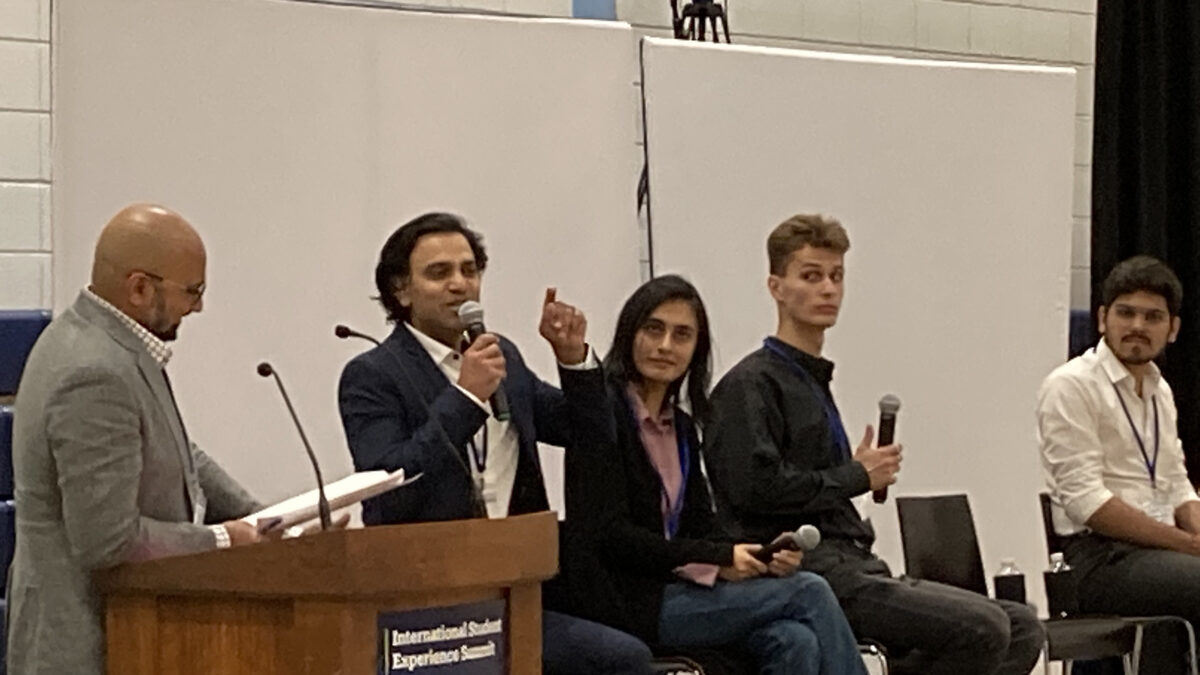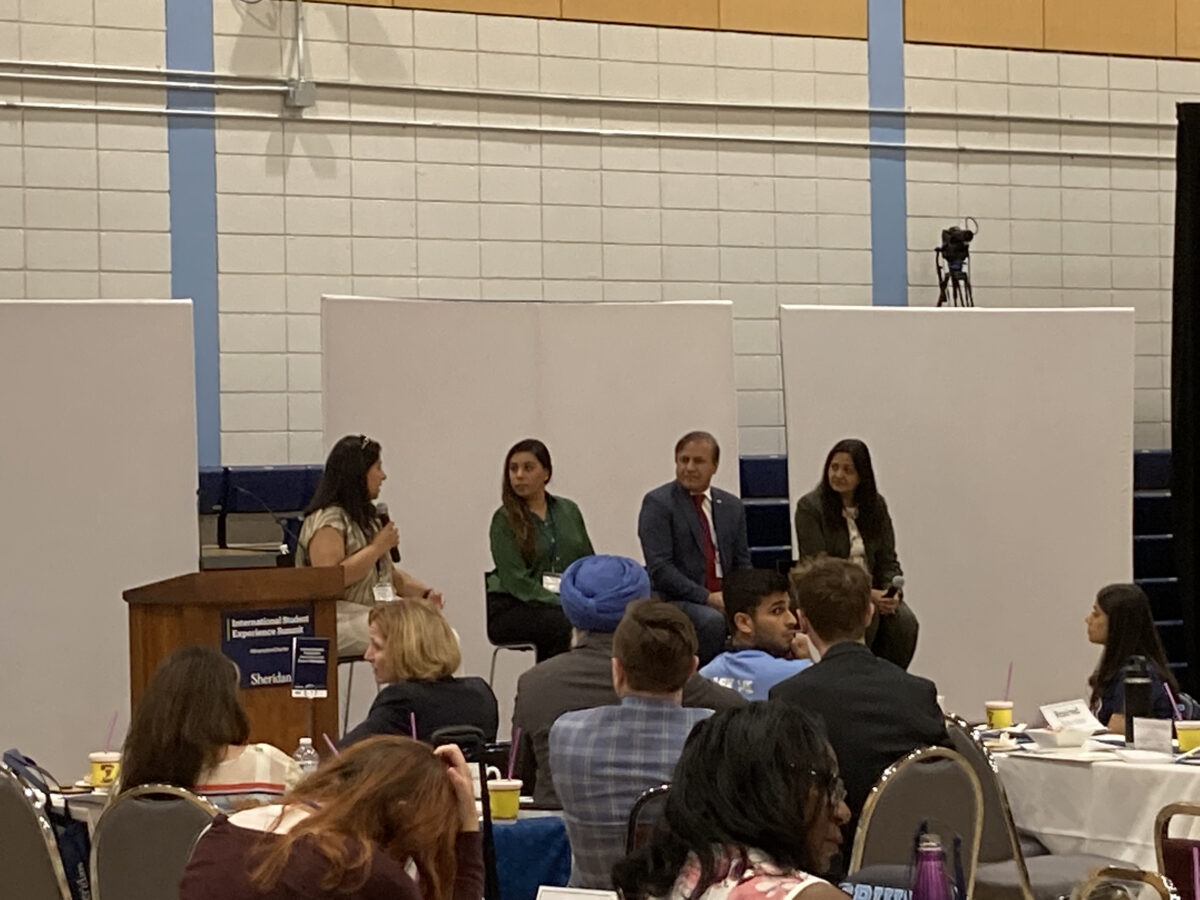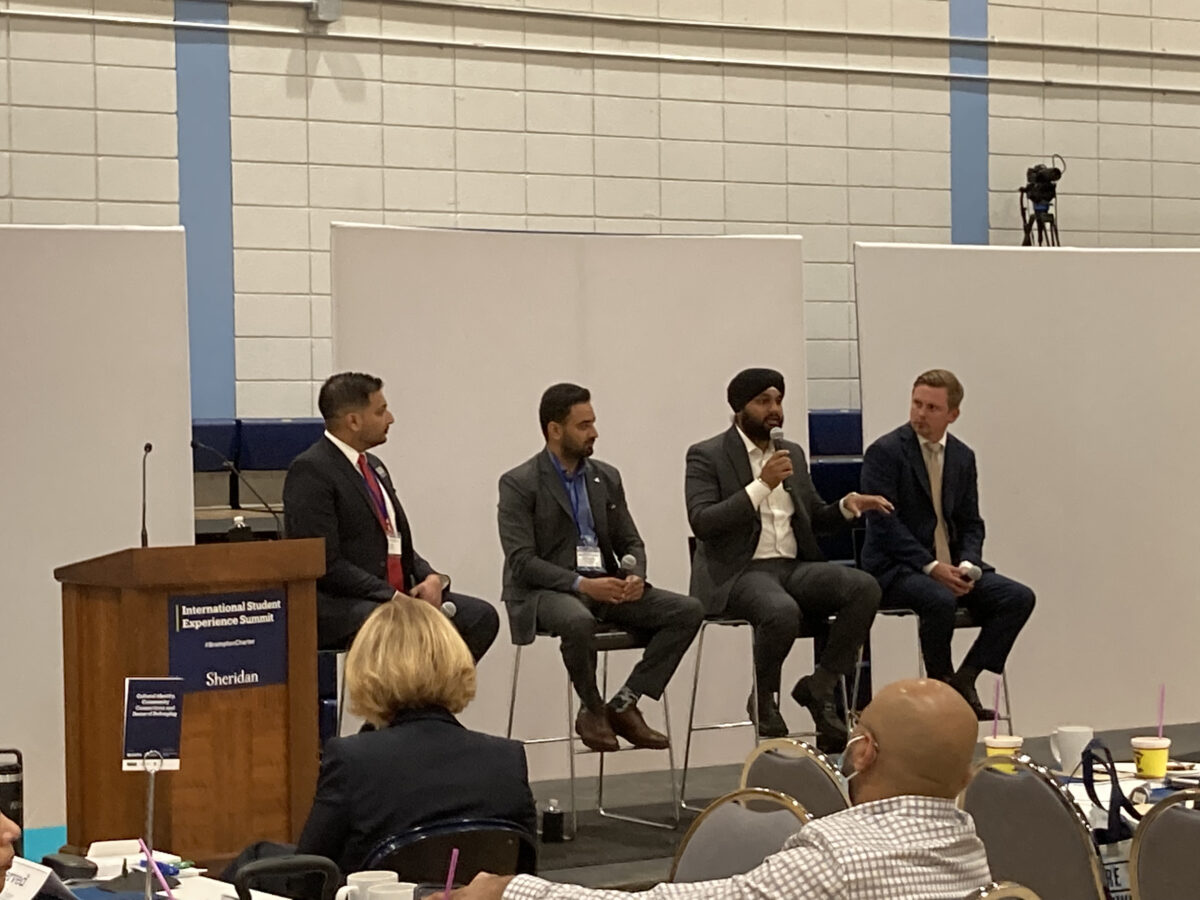The international student summit ended Wednesday afternoon after over 200 leaders from postsecondary schools, community groups and governmental branches came to Sheridan’s Davis campus to discuss issues affecting international students. The summit is part of a larger strategy designed by Brampton’s International Student Experience Roundtable to improve the experience of international students. This subpopulation of the Canadian student body is particularly vulnerable to food, financial and housing insecurity, as well as racial discrimination and mental health disorders.
“International students enrich the culture and vibrancy of our communities,” says Dr. Amira Al Masri, Sheridan’s Director of Global Education and Internationalization.
Doctor Al Masri says international students bring a variety of perspectives to the Brampton community, which helps to reduce harmful stereotypes.
“It’s up to all of us to build a welcoming atmosphere to help them flourish,” says Al Masri.
“When international students succeed, our whole community thrives,” says Janet Morrison, president, and vice-chancellor of Sheridan College.
The Summit kicked off Tuesday morning with a discussion panel featuring international students at various stages of their academic careers, and at various stages of integration into Canada. One of the ongoing themes of the opening panel was that there are systemic barriers preventing international students from succeeding.
Many international students arrive in Canada with high expectations. University and College recruiters sell students on a promising future in Canada, but fail to prepare them for the realities of adjusting to a new culture.

“Once we land here the honeymoon ends in probably a month,” says, Aamir Amla, Student Relations Director for Brilliant Minds and graduate of Humber College.
Aamir is described by his peers as an international student success story. He says before he enrolled at Humber, he had the advantage of learning about Canada’s culture slowly through his job as a flight attendant.
“You have to be prepared for it. You just can’t come here and then try to figure it out,” says Aamir.
“You should have a mentor,” he says. “Your professors are the first people or the first coach that you should think about.”
The need for mentors and other supportive figures was touched on by some of the other panelists as well. One student spoke at length of what it was like to arrive in Canada unprepared for the adjustment.
“My hopes and aspirations were just, I will study well and I might have a job someday. But nobody told me how tough it was to get a job in the first place,” said Parina Khosla, a psychology student at York University.
The gap between expectations and reality was a hard bridge to cross for most of the panelists. Parina says it was especially hard to form friendships as an international student.
“I didn’t know how to really make friends. I mean, that’s hard. Because we have a different accent, we have a different cultural background,” said Parina.
Housing too was an issue. Leia Ali-Trini, a finance student at Sheridan College says her housing arrangements fell apart when she arrived in Canada a little over half a year ago.
“My accommodation did not work out, so when I first came to Canada, I was practically by myself,” said Leia.
Housing is an essential part of a student’s success. It’s difficult to focus on school when you don’t have a safe place to sleep at night. “The minute that my housing pretty much fell apart, it was impossible for me to think and focus,” said Leia.
“I wish there were more resources,” said Leia, who is currently in the process of relocating again. She says the waiting list for residence is too long, and she herself can’t get back in.
“If you don’t have housing settled, it just makes you feel sort of unstable, because if you don’t have a specific environment to study in, then how would you be able to focus?”
The student panel set the tone for the rest of the conference. What followed were a series of discussion panels including one featuring the MPs of Brampton, Ruby Sahota, Shafqat Ali and Sonia Sidhu.
The three MPs spoke at length about the role of the federal government in improving the experience of international students through its immigration policies.
“I really think the 20 hours is ridiculous,” said one questioner to the panel. The questioner was referring to a federally mandated limitation on work hours for student visas.

“There’s an argument to be made that there might be a balance that we need to achieve,” said MP Ruby Sahota, who was concerned that removing all working limitations would lead students to compromise their studies in favour of their jobs.
One questioner in attendance responded by saying this concern was patronizing.
The last panel before the conference broke for lunch featured Brampton’s Provincial Members of Parliament, Amarjot Sandhu, Hardeep Grewal, and Graham McGregor.
One topic they covered at length was worker rights protections for international students.
“You have every right to refuse unsafe work,” said MPP McGregor.
International students are particularly vulnerable to exploitation by predatory employers. As MPP Grewal pointed out, many are new to the country and are unfamiliar with their worker rights. Furthermore, the hourly cap on student visas leads some students to work under-the-table, where they become much more vulnerable to exploitation.

After lunch, the concurrent workshops where industry specialists and experts discussed solutions to these problems in greater detail. There were workshops on housing, employment, mental health, racism and academics, to name a few.
The following Tuesday, July 26, The conference picked up with a panel featuring Brampton City Counsellors, Rowena Santos, Paul Vicente, Hakirat Singh and Gurpreet Dhillon.
“The international student phenomena in Brampton has been a point of discussion for many years, and it’s great to see us addressing it,” said Counsellor Singh.
Among issues like protections against local crime and mentorship opportunities available to international students, affordable housing solutions were fielded by the panelists.
“It’s no secret that the city of Brampton, for decades, has been a city that has sprawled outwards, single-family homes. This council has changed that direction significantly,” said Counsellor Vicente.
He added that the council has approved many new developments to increase density and provide more affordable options than single-family houses.
After lunch, Sheridan hosted a discussion on the role of the media in the international student experience, among other topics.
“Let’s also talk about some good stories,” said Senior Manager at Omni TV and discussion moderator, Jake Dheer as he spoke of the way we engage with cultural media.
“Over the years, trust in what we do, what we report, has been going down,” said reporter and talk show producer at RED FM, Prabhjot Sohal.
“We need to think how we are amplifying negative stereotypes, how we are focusing more on the problem and not on the solutions,” she added.
The conference ended with a steel drum performance by Peter Amponsah, and some heartfelt thanks from Morrison to the panelists, contributors, and attendees.
“What’s important is that we take what we talked about, what we’ve talked about again, and translate it into action,” she said.
Moving forward the International Student Experience Roundtable aims to implement a strategy to make Brampton a leader in the effort to do better for this important part of the Canadian student community.
